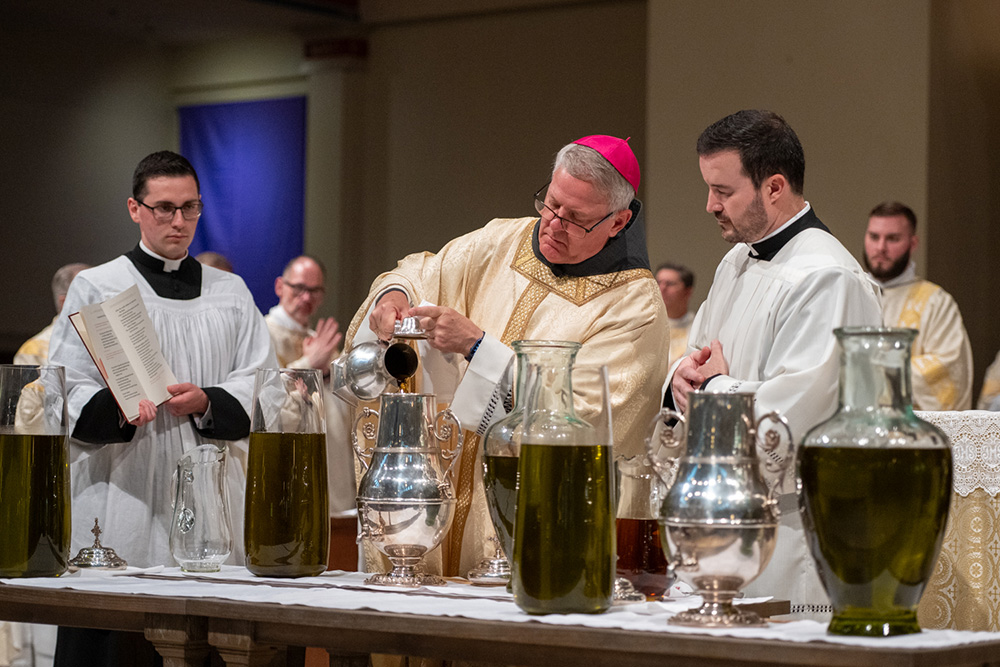'I'm so grateful for your yes'

Bishop Martin tells priests: Proclaim the Good News to a world in need
HUNTERSVILLE — The spiraling, majestic sounds of organ and trumpet greeted a procession of more than 100 priests who filed into St. Mark Church Tuesday morning for the annual Chrism Mass.
Held each year at the beginning of Holy Week, the Chrism Mass is a special liturgy where oils used in the Church’s sacred rituals and sacraments are consecrated and priests renew their promises and commitment to their ministry.
Bishop Michael Martin called on his fellow priests to go out and “proclaim the Good News to a world in need” during his first Chrism Mass since being ordained as Bishop of Charlotte in May 2024.
The Chrism Mass was moved this year to St. Mark from St. Patrick Cathedral to enable more people to attend, especially students, families and those preparing to enter the Church at Easter. A diverse crowd of more than 650 people filled the pews, including many families with children and a group of 30 students from Holy Trinity Middle School in Charlotte.
“Immersed as we are in Holy Week, we come to a sacred moment where we celebrate God’s gift of the priesthood and these sacred oils,” Bishop Martin told the congregation.
He gave an emotional homily that focused on the promises priests make when they are ordained. The solemn ritual of the day reminded him of his ordination as a priest and as a bishop, he said, but “most importantly, the emotion most prominent in my heart is the memory of two priests in particular in my own faith journey that were unconditional in their sharing of the Good News.”
He invited the congregation to close their eyes for a moment and “picture a priest whose presence in your life was transformational.”
He told the gathered priests that the images brought to mind in that moment reflected the life-changing work priests are doing. He reminded the men that their ministry requires them to offer unconditional love and “spiritual fatherhood” not only to their congregation, but to everyone, especially the poor and marginalized.
“Any time we accept spiritual fatherhood, we accept unconditional responsibility,” he said. “We don’t get to pick our flock. In fact, we’re called constantly to expand our vision of who our flock really is – not simply those who go to church every Sunday but every soul who inhabits the area where we’re sent to serve.”
“What does unconditional responsibility mean?” he asked. “It means deep within the core of our being there is a heart of love that is always expanding in its desire to go out and love unconditionally those who we are called to serve.”
He added, “And like Jesus, who in the Scriptures spent much more time outside the synagogue, outside the temple, may we accept that same responsibility unconditionally, to get outside of our churches, outside of our chapels, outside of our offices, and go out and encounter the People of God – especially those most on the margins.”
Bishop Martin said he fights the temptation daily to “make his world smaller” as responsibilities and demands pile up, and he acknowledged that can happen to parish priests as they deal with tasks that can seem to take away from the work they promised to do at their ordination.
He encouraged the men to work “not to narrow the focus but to broaden it,” to always be willing to reach out to share the Good News of Christ with all they encounter.
“Praise God for the ways in which you all have been unconditional in your love for the people entrusted to you, and our Church is richer because of that,” he said. “Praise God for you…I’m so grateful for your yes. I am so grateful for your service. I’m so grateful for your love of the People of God.”
Bishop Martin then blessed the holy oils which are used in the sacraments of baptism, confirmation, ordination of priests and anointing of the sick, as well as the consecration of churches and altars.
After the Mass, many people gathered in the courtyard to take photos with Bishop Martin and priests who attended.
The day offered people a chance to reconnect with priests they know and thank them for their ministry, said Kathleen RoseBellow, a member of St. Mark.
“It was a beautiful Mass – you could feel the holiness and a real blessing,” she said. Seeing so many priests together was just very moving. and the consecration of the oils was beautiful.”
Steve Hansen, who attends St. Andrew the Apostle Church in Mars Hill, was attending his first Chrism Mass and said it was a special experience for him as he prepares to enter the Church at the Easter Vigil on April 19.
“It’s a powerful Mass to witness,” Hansen said. “There was so much reverence and it was an awesome thing to see for someone like me who is brand new to the Church.”
— Christina Lee Knauss. Photos by Amy Burger and Troy C. Hull.
Watch the blessing of the holy oils
On the Diocese of Charlotte's YouTube channel, watch a video highlight from the Chrism Mass of the blessing of the holy oils
Jubilarian priests
Priests celebrating milestone anniversaries of ordination this year were recognized by Bishop Martin at the conclusion of the Chrism Mass:
- Father James K. Solari, 70 years
Father Richard N. Hanson, 50 years
Father Lawrence W. Heiney, 50 years
Father Joseph V. Milligan, 50 years
Father Francis J. O’Rourke, 50 years
Father David T. Brzoska, 25 years
Father Joseph L. Dinh, 25 years
Father Christopher M. Gober, 25 years
Father Matthew Kauth, 25 years
Father Shawn O’Neal, 25 years
Father Baiju P. Puthussery, 25 years
Father Frank J. Seabo, 25 years









































